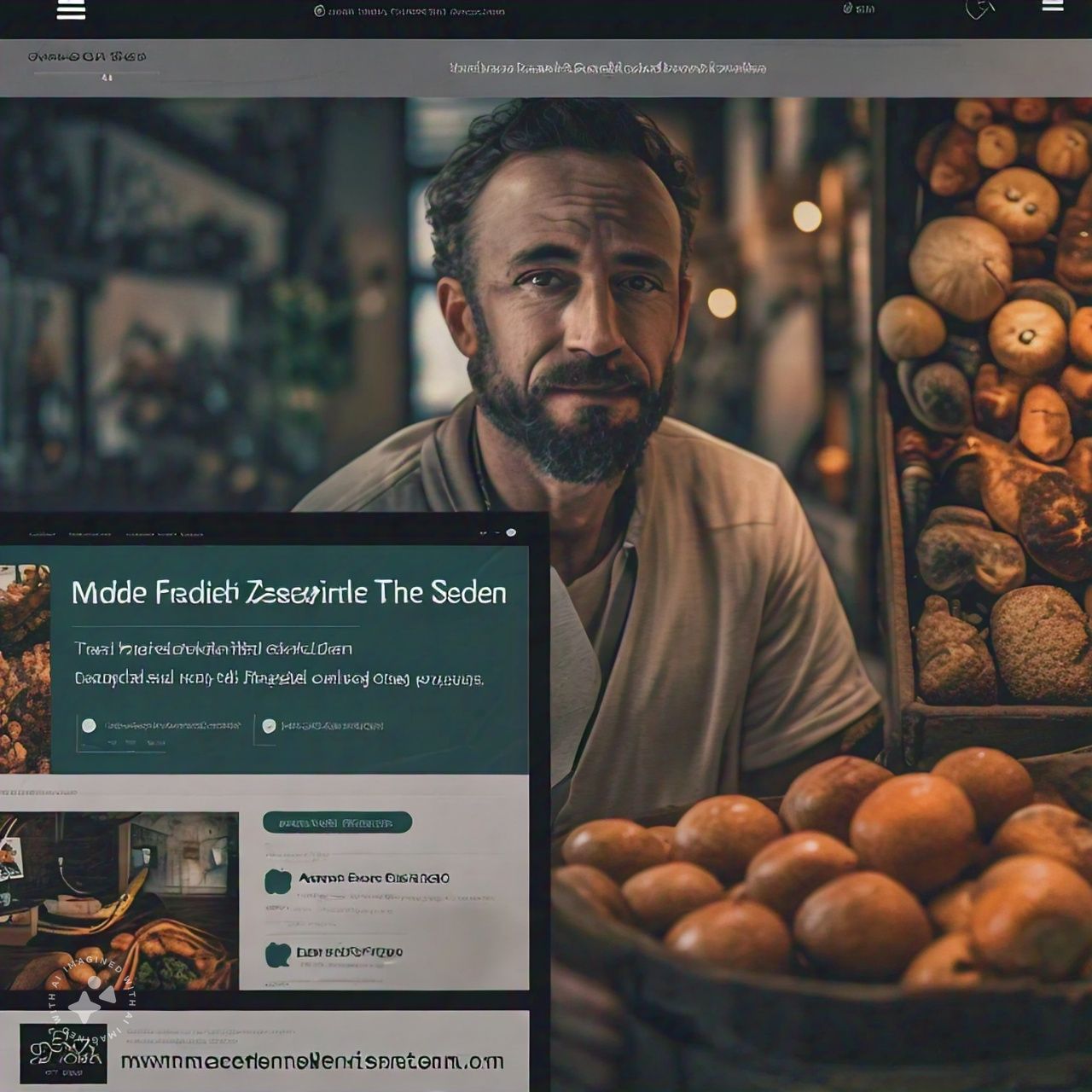
Why a Strong Online Presence is Crucial for New Businesses
The digital age has shifted how we connect, shop, and learn. So, as a new business, ignoring the online world is like missing out on a conversation where your potential customers are already talking about your products or services. Online presence for your business isn’t just about having a website, it’s about creating a digital footprint that allows customers to discover you, connect with your brand, and eventually make a purchase.
The importance of an online presence goes beyond just visibility — it’s about establishing credibility, fostering trust, and opening new channels for marketing and customer engagement. Whether you’re a small start-up or launching a new venture, creating a strong small business online presence should be at the top of your list.
Let's dive into why this is such a game-changer for new businesses. We’ll explore the specific benefits of online presence for business, practical ways to build and manage your web presence marketing, and how a solid digital foundation can drive growth in ways you might not have considered before.
The Foundations of a Strong Online Presence

What Does an Online Presence Mean Today?
In the past, businesses depended heavily on brick-and-mortar establishments and word-of-mouth to draw in customers. While these traditional channels are still effective, they now represent just a portion of the bigger picture. Today, an online presence for small businesses means being visible across multiple platforms — be it through social media, a professional website, search engines, or business directories.Think of your online presence as your business card, storefront, and reputation rolled into one, accessible 24/7. It’s your chance to put your business front and center where it matters—right where customers are spending their time. In fact, over 80% of consumers research a business online before deciding to visit or make a purchase. This makes a compelling case for investing time and resources into your online presence for your business.Three Key Benefits of a Professional Online Presence
 Building a professional online presence does more than make your business look good; it brings real, measurable benefits.Let’s look at what are three benefits of a professional online presence:
Building a professional online presence does more than make your business look good; it brings real, measurable benefits.Let’s look at what are three benefits of a professional online presence:1. Increased Visibility
A professional online presence for your business puts you in front of the people who matter most — your potential customers. Whether they are searching on Google, scrolling through Instagram, or exploring review sites, being present increases the chance that your business will get noticed.An attractive, well-optimized website combined with engaging social media accounts ensures you’re seen as a credible option when people search for products or services in your niche.2. Establishing Credibility and Trust
A business with a well-crafted website and consistent social media presence comes across as more trustworthy. Customers want to know they’re dealing with a legitimate company.A professional small business online presence showcases your brand’s voice, mission, and values.Customer testimonials, detailed product descriptions, and active customer support online all add to the trustworthiness of your brand. If a customer can see your values and interact with you virtually, they’re more likely to trust you over a competitor who lacks an online presence.3. 24/7 Marketing and Customer Interaction
A strong online presence acts as a round-the-clock marketing machine. Unlike a physical store that closes, your website and social media pages are always open, providing customers with the information they need, whenever they need it.This 24/7 web presence marketing means your brand stays in the customer’s mind long after your business hours are over. It also means customers can interact with your content, read reviews, and even make purchases whenever it’s convenient for them.Building an Effective Online Presence for Small Business
Start with a Professional Website
When it comes to establishing an online presence for your business, a professional website is non-negotiable. Think of your website as the heart of your online efforts — it’s where potential customers come to learn more about you, understand your offerings, and determine if your products or services align with their needs.To truly maximize the benefits of online presence for business, your website needs to be well-designed, mobile-friendly, and optimized for search engines (SEO).Mobile-Friendly Design
 Over 50% of web traffic now comes from mobile devices, making it crucial that your website is responsive. A small business’s online presence must cater to users who are accessing your site on the go. A mobile-friendly website ensures a smooth browsing experience for users, which helps boost engagement and reduce bounce rates.
Over 50% of web traffic now comes from mobile devices, making it crucial that your website is responsive. A small business’s online presence must cater to users who are accessing your site on the go. A mobile-friendly website ensures a smooth browsing experience for users, which helps boost engagement and reduce bounce rates.SEO Optimization
An optimized website ensures that your business ranks higher in search engine results. Utilizing relevant keywords, including content-rich blog posts, and adding meta descriptions helps increase your site’s visibility. Effective SEO is a vital part of web presence marketing, as it draws organic traffic, connecting you with customers who are actively searching for what you offer.Compelling Content
Your website should provide value to visitors. Create engaging content, such as blog posts, videos, and guides, that not only informs but also helps establish your authority in your industry. By offering value, you’re not just promoting your products — you’re building trust and positioning your business as a reliable resource in your niche.Establishing a Social Media Presence

Your online presence for small business extends far beyond just your website. Social media platforms like Facebook, Instagram, LinkedIn, and Twitter offer powerful tools to engage with customers, promote your products, and even provide customer service.
Choosing the Right Platforms
It’s essential to choose the platforms where your target audience is most active. If you’re a visually-driven brand, Instagram and Pinterest may be ideal for showcasing your products. If you’re a B2B business, LinkedIn might be more effective for networking and industry insights.Consistency is Key
When building an online presence, consistency helps solidify your brand image. Use the same logo, color scheme, and tone across all your social platforms.Consistent posting schedules, content that aligns with your brand values, and regular interaction with followers are all part of crafting a solid small business online presence.Engaging Content and Community Building
Engaging your audience means more than just posting promotional content. Encourage user interaction through polls, Q&A sessions, contests, and behind-the-scenes posts.By fostering a community, you humanize your brand and develop loyal followers who are more likely to support your business and share your content.Leveraging Online Reviews and Customer Feedback

Reviews play a crucial role in how potential customers perceive your business. A significant part of your online presence for your business is built on customer trust, and reviews are a direct reflection of that trust.
Encourage Positive Reviews
Make it a habit to ask satisfied customers to leave reviews on Google, Yelp, or other relevant review sites. These reviews not only enhance your credibility but also help with SEO, improving your visibility in search results.Highlighting these positive experiences is an effective web presence marketing tactic that shows potential customers how much others value your services.Addressing Negative Feedback
Handling negative reviews professionally can turn a dissatisfied customer into a loyal one. Always respond promptly and empathetically, and offer solutions when addressing complaints.A well-managed response can speak volumes about your business values and commitment to customer satisfaction.Leveraging Online Reviews and Customer Feedback

Reviews play a crucial role in how potential customers perceive your business. A significant part of your online presence for your business is built on customer trust, and reviews are a direct reflection of that trust.
Encourage Positive Reviews
Make it a habit to ask satisfied customers to leave reviews on Google, Yelp, or other relevant review sites. These reviews not only enhance your credibility but also help with SEO, improving your visibility in search results.Highlighting these positive experiences is an effective web presence marketing tactic that shows potential customers how much others value your services.Addressing Negative Feedback
Handling negative reviews professionally can turn a dissatisfied customer into a loyal one. Always respond promptly and empathetically, and offer solutions when addressing complaints.A well-managed response can speak volumes about your business values and commitment to customer satisfaction.Local Directories and Google My Business
For small businesses, being listed in local directories and maintaining an active Google My Business profile is key. This helps establish your small business’s online presence within your local community.Google My Business (GMB)
GMB is one of the most effective ways to ensure your business shows up in local searches. Updating your profile with your contact information, business hours, photos, and customer reviews gives your business added visibility.Optimizing your GMB profile can make a big difference when people search for businesses 'near me' or specific services in your area.Local Directories
Make sure your business is listed in reputable local directories. These directories increase your business’s visibility and can also improve your website’s SEO by providing quality backlinks.They are an essential part of web presence marketing that adds an extra layer of discoverability for potential customers.Effective Web Presence Marketing Strategies
Content Marketing: The Backbone of Your Online Presence
 Content is at the heart of any successful web presence marketing strategy. It’s not just about filling your website with text; it’s about creating meaningful, valuable content that speaks directly to your audience and solves their problems.
Content is at the heart of any successful web presence marketing strategy. It’s not just about filling your website with text; it’s about creating meaningful, valuable content that speaks directly to your audience and solves their problems.Blogging and Informative Articles
Regularly updating your website with blogs and informative articles helps in several ways. It keeps your audience informed, establishes your authority in your niche, and boosts your SEO rankings.Articles about industry trends, how-to guides, and even behind-the-scenes content can bring people back to your website, further enhancing the online presence of your business.Video Content
Videos are highly engaging and offer a dynamic way to showcase your products or services. By incorporating videos, you can communicate complex messages more effectively, showcase customer testimonials, or give virtual tours of your business.Video content not only helps boost your small business’s online presence but also keeps users engaged for longer, increasing the likelihood of conversion.User-Generated Content (UGC)
Encouraging your customers to share their experiences with your product or service is an excellent way to add authenticity to your brand. Sharing UGC on your website or social media provides social proof, enhancing your credibility.This type of content can be anything from a customer testimonial video to a photo of someone using your product. UGC builds trust and fosters a sense of community, which is crucial for a strong online presence for small businesses.Search Engine Marketing (SEM) and Paid Ads
While organic efforts like SEO and content marketing are effective, it often takes time to see results. This is where paid ads can provide a much-needed boost. SEM, or search engine marketing, helps to improve your visibility almost immediately.
Google Ads
Google Ads are a powerful way to get your business in front of people searching for specific keywords. By using keyword-rich ad copy, you can target audiences actively seeking your product or service.The results are measurable, and you can refine your campaigns over time to maximize efficiency.Social Media Advertising
Platforms like Facebook, Instagram, and LinkedIn offer sophisticated targeting options that allow you to reach your ideal customers based on demographics, interests, and behaviors.For a new business looking to build its online presence, running targeted ads can create awareness and generate leads right from the start.Social Proof: Building Trust through Testimonials and Influencers
In the digital world, customers rely heavily on social proof to determine if a business is trustworthy. Integrating social proof into your web presence marketing strategy can significantly boost your credibility.
Customer Testimonials and Reviews
Featuring customer testimonials and showcasing positive reviews on your website can help build trust and encourage others to engage with your brand. Highlighting these testimonials on product pages, your homepage, or even social media makes your business look more reliable.Positive reviews and testimonials help amplify the benefits of online presence for businesses by demonstrating that real people trust your brand.Influencer Marketing
Partnering with influencers in your niche can help spread the word about your products to a much larger audience. Influencers already have established relationships with their followers, which means their endorsement carries weight.By working with micro-influencers — those with smaller, highly engaged followings — you can drive targeted traffic to your website and increase your online presence for your business without breaking the bank.Email Marketing: Engaging Your Audience Consistently
Email marketing remains one of the most effective ways to keep your audience informed and engaged. A well-curated email campaign can increase website traffic, promote new products or services, and foster customer loyalty — all essential components of building a strong small business online presence.
Build an Engaged Email List
 Invite website visitors to sign up for your newsletter by offering something valuable, such as a discount code or an exclusive guide. A highly targeted and engaged email list provides a direct line of communication to your audience, allowing you to keep them informed about new products, special promotions, or company updates.
Invite website visitors to sign up for your newsletter by offering something valuable, such as a discount code or an exclusive guide. A highly targeted and engaged email list provides a direct line of communication to your audience, allowing you to keep them informed about new products, special promotions, or company updates.Personalized Content
Personalization makes a big difference in engagement rates. Using customer data, such as their purchase history or browsing habits, allows you to tailor your emails to individual preferences. This personalized approach can help strengthen your relationship with customers, making your business a trusted source for their needs.Measuring the Success of Your Online Presence
Establishing an online presence for your business is just the beginning; the key to long-term success is measuring its effectiveness and making informed adjustments.
Tracking performance allows you to understand what’s working, what needs improvement, and how you can maximize the benefits of online presence for business.
Key Performance Indicators (KPIs) for Online Presence
To effectively gauge your small business’s online presence, it’s important to track the right metrics. Key Performance Indicators (KPIs) are specific, measurable metrics that can help you understand the impact of your online strategies.Website Traffic
One of the most straightforward indicators of your online presence is the number of visitors coming to your website. Tools like Google Analytics provide detailed insights into your traffic sources, such as organic search, direct visits, social media, or referrals.Monitoring these metrics helps you understand which channels are bringing in the most visitors and where to focus your efforts.Bounce Rate and Dwell Time
A high bounce rate (when users leave your site after viewing only one page) may indicate that your content isn’t engaging enough or that visitors aren’t finding what they’re looking for. On the other hand, dwell time (how long visitors spend on your site) is an indicator of user engagement.Tracking these metrics can help you optimize content and make your website more user-friendly, ultimately enhancing your online presence for small businesses.Social Media Engagement
On social platforms, engagement metrics such as likes, comments, shares, and follower growth are key indicators of your brand’s online presence. High engagement means your content resonates with your audience, making it an essential part of your web presence marketing strategy.Lead Generation and Conversion Rates
The ultimate goal of building an online presence is to drive leads and conversions. Tracking the number of leads generated through forms, contact requests, and email subscriptions can give you a clear picture of how well your online presence for your business is performing.Conversion rates — whether for purchases, sign-ups, or other actions — are vital metrics to gauge your return on investment (ROI).Tools to Track Your Online Presence
There are several tools available to track the success of your web presence marketing efforts. These tools provide valuable data to help you make informed decisions.Google Analytics
Google Analytics is an essential tool for tracking website traffic, user behavior, and conversion rates. It provides insights into who your audience is, what content they engage with, and how they navigate your website.This data is crucial for making adjustments to improve the user experience and maximize the benefits of online presence for business.Social Media Analytics
Each social media platform has its own analytics tools — Facebook Insights, Instagram Insights, LinkedIn Analytics — that help you measure audience engagement.These tools show which types of posts get the most interactions, the demographics of your audience, and the times when they are most active.SEO Tools (Ahrefs, SEMrush, Moz)
SEO tools can help you analyze your website’s keyword rankings, backlinks, and domain authority. These tools allow you to see how well your website is optimized for search engines and how you stack up against competitors, helping you maximize your small business online presence.Customer Relationship Management (CRM) Software
CRMs like HubSpot, Salesforce, or Zoho can track leads generated through your online presence, providing a comprehensive view of customer interactions and their journey with your business.Using a CRM helps you understand which strategies are most effective in moving customers through your sales funnel.Adapting Your Strategies for Continuous Improvement
Collecting data is just the first step; the real power lies in using that data to refine your strategy and enhance your online presence for small businesses.A/B Testing
A/B testing, also known as split testing, involves comparing two versions of a webpage, ad, or email to determine which one performs better.By experimenting with different headlines, images, calls-to-action (CTAs), and layouts, you can continuously improve the effectiveness of your web presence marketing campaigns.Content Optimization
Use the insights from your analytics to determine which types of content perform best and resonate most with your audience. Are your blog posts getting the most views? Are videos driving engagement? Adjust your content strategy accordingly to focus on what works.User Feedback and Surveys
Direct feedback from customers is invaluable. Encourage visitors to provide feedback on their experience through surveys, contact forms, or live chat.Understanding what your audience likes and dislikes helps you make the necessary changes to improve their experience, ultimately boosting your online presence for your business.Competitive Analysis
Keeping an eye on your competitors is also crucial. Identify what they’re doing well and see if there’s anything you can adapt for your own strategy.For instance, if a competitor’s content is outperforming yours, analyze their keywords, content format, or posting schedule to see how you can improve your own.Adapt to Market Trends
The digital landscape is constantly changing, and your small business’s online presence should evolve along with it.Stay informed about changes in consumer behavior, search engine algorithms, and social media trends. This will ensure that your strategies remain relevant and effective in attracting and converting customers.Invest in Your Online Future with Aurora Insights
A strong online presence for your business is crucial for establishing credibility, reaching your target audience, and standing out from the competition. With the right mix of content, targeted ads, social proof, and constant measurement, you can create a web presence marketing strategy that drives real business growth. As a new business, it’s not just about being online—it’s about being strategic, consistent, and customer-focused.
Aurora Insights is here to help you make that leap. We provide the expertise, tools, and personalized strategies that take your small business online presence from ordinary to exceptional. Let us be your partner in building a digital presence that not only competes but thrives.
Ready to grow your online presence and stand out in the market? Reach out to Aurora Insights today, and let’s start building your path to success.
